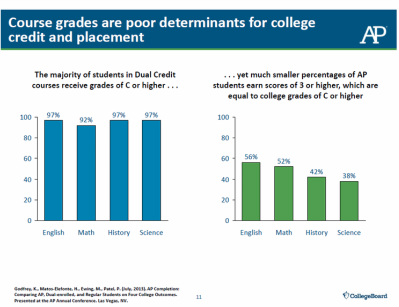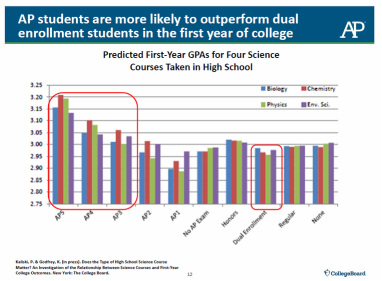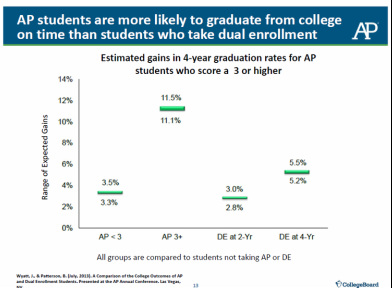|
Art created by AP Studio Art student at Lincoln High School Haley Brunk.
|
Advanced Placement courses are college-level courses taken in high school. A national exam is given in May of each year and scored on a 1 to 5 scale. A score of a 3, 4 or 5 is considered passing and leads to college credit in most all 4-year colleges and universities. There are 33 different Advanced Placement courses available to high school students.
The rewards of completing an AP course are many! Research proves that the knowledge and experience of taking a college-level course in high school will better prepare you for success after high school. You will learn many important skills in organization, time management, reading, writing and habits of mind. The AP course designation on your resume shows college admissions officers that you are willing to challenge yourself with difficult courses and can help with scholarship competitions as well.
The rewards of taking an AP exam include an opportunity to earn a passing score and college credit in high school. In addition, a passing score may lead to advanced placement in college. Taking difficult exams like AP exams prepares you for other challenging tests such as SATs, ACTs, and other college entrance tests.
|
|
Scores were released in July. You must create an online account to access your scores.
Create an account here. You can access a preview of the information you will enter when creating your account. It’s important to be prepared with the information ahead of time, or the site may time out.
Click on the link below and you’ll find easy access to find out the AP credit policy at colleges and universities nationwide! Search by college or university and you can see what score is needed to earn credit hours and advanced placement.
collegeboard.org/apcreditpolicy |
Art created by AP Studio Art student at Lincoln High School Lauren Rouse.
|
Registration for Advanced Placement Exams takes place entirely at home schools, whether or not the student takes the AP class at the home school or Central Academy. Out of District students will pay for exams at Central Academy.
Cost:
$98.00/exam ($146 per Capstone exam -- Seminar or Research).
Each AP exam requires a $40 non-refundable deposit by students. The fee is $40 because that is the unused test fee charged by the College Board.
Qualifying students may have their AP exam fee(s) waived thanks to a grant from the United Way of Central Iowa. We hope to continue this partnership with United Way for AP Exams. Students who qualify for free or reduced priced lunch should reach out to a school counselor when registering for AP exams.
Process:
Students register for AP exams on myap.collegeboard.org
Students create a College Board account and use a JOIN CODE provided by their AP teacher(s) to sign up for the exam.
Students must register online and pay the non-refundable deposit of $40 before November 3. Payment is to the school bookkeeper.
The bookkeeper uses a list generated from the College Board and puts all of the fee assignments into Infinite Campus.
You can track your payments using Infinite Campus.
Exam Schedule and locations FY2024:
Cost:
$98.00/exam ($146 per Capstone exam -- Seminar or Research).
Each AP exam requires a $40 non-refundable deposit by students. The fee is $40 because that is the unused test fee charged by the College Board.
Qualifying students may have their AP exam fee(s) waived thanks to a grant from the United Way of Central Iowa. We hope to continue this partnership with United Way for AP Exams. Students who qualify for free or reduced priced lunch should reach out to a school counselor when registering for AP exams.
Process:
Students register for AP exams on myap.collegeboard.org
Students create a College Board account and use a JOIN CODE provided by their AP teacher(s) to sign up for the exam.
Students must register online and pay the non-refundable deposit of $40 before November 3. Payment is to the school bookkeeper.
The bookkeeper uses a list generated from the College Board and puts all of the fee assignments into Infinite Campus.
You can track your payments using Infinite Campus.
Exam Schedule and locations FY2024:
| ap_exam_schedule_2024_and_locations.pdf | |
| File Size: | 141 kb |
| File Type: | |
Why both are important for students . . . |
Advanced Placement· Courses developed by committees of experts representing universities across the United States.
· Quality varies from teacher to teacher, so students take an end-of-course AP exam that is developed and scored externally by professors and discipline experts, verifying the extent to which the student has mastered the college-level material. · Because there is an external assessment, credit/placement for AP is granted by most (94% of) U.S. colleges and universities. · Because there is an external assessment, AP is a valuable indicator in the college admissions process of a student’s ability to succeed in college. AP.Advantages
Feedback for students and teachers. Standardized curriculum. Recognized across the country and worldwide as a rigorous curriculum. Standard training and syllabus required for all instructors. Ability to earn scholarships and national recognition. Can be transferred from school to school. Disadvantages Must pass test to earn credit. Must pay testing fee. |
Dual Credit.· Courses developed by local community colleges.
· Quality varies from teacher to teacher, no external assessment measure to verify the rigor and quality of the course. · Because there is no external assessment, dual credit courses are not as widely recognized for credit/placement as AP courses. · Because there is no external assessment, dual credit courses are less valuable indicators in the college admissions process of a student’s ability to succeed in college Dual CreditAdvantages
In many cases, no test is required to earn credit. Credit earned accepted at most in state institutions. Additional monies for dual credit programs. DMACC credit earned can be transferred easily to Regents schools (and others) in Iowa. Disadvantages Credit awarded depends on the receiving college/university. No feedback on teaching or understanding. No uniform curriculum. No uniform training or syllabus. Credits may not transfer between colleges. |













